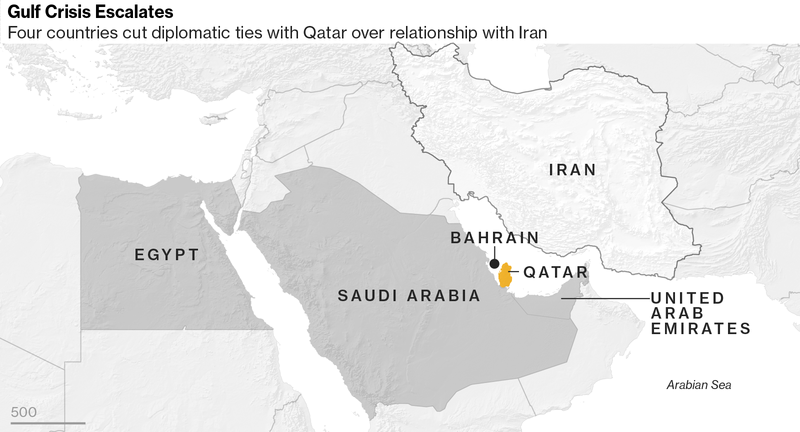Egypt, UAE, Bahrain, Yemen, Libya, Maldives join in
Several major powers in the Middle East cut diplomatic ties with Qatar today, including fellow OPEC members Saudi Arabia, the UAE and Libya, citing the country’s support of terrorism.
Saudi Arabia, Egypt, UAE and Bahrain each ceased relations with Qatar in an arranged diplomatic move, which was later echoed by Yemen, Libya and the Maldives. Saudi Arabia, Bahrain and UAE have each given Qatari visitors and residents two weeks to leave the countries.
The Arabian Gulf countries will also restrict Qatari aircraft and vessels from entering their airspace and territorial waters. It is unclear if the countries will attempt to restrict the country from trading with other countries.
World energy: Qatar supplies one-third of global LNG
The conflict has the potential to conceivably disrupt the international energy trade significantly.
Qatar does not produce a very large amount of oil, only about 600 MBOPD, but traders are concerned the tension will weaken overall compliance with cuts. Oil prices dropped today, with the international benchmark Brent slipping by about 1%.
Qatar – OPEC data below covers 2015’s production, reserves, exports:
| Value of exports (million $) | 77,294 |
| Value of petroleum exports (million $) | 28,303 |
| Current account balance (million $) | 13,751 |
| Proven crude oil reserves (million barrels) | 25,244 |
| Proven natural gas reserves (billion cu. m.) | 24,299.1 |
| Crude oil production (1,000 b/d) | 656.0 |
| Marketed production of natural gas (million cu. m.) | 178,472.0 |
| Refinery capacity (1,000 b/cd) | 283.0 |
| Output of refined petroleum products (1,000 b/d) | 611.3 |
| Oil demand (1,000 b/d) | 206.0 |
| Crude oil exports (1,000 b/d) | 490.7 |
| Exports of petroleum products (1,000 b/d) | 521.0 |
| Natural gas exports (million cu. m.) | 129,877.2 |
- b/d (barrels per day)
- m. (cubic metres)
- b/cd (barrels per calendar day)
Source: Annual Statistical Bulletin 2016 from OPEC
Qatar is highly influential in liquefied natural gas, however, and supplies about one-third of the world’s supply of LNG according to Reuters. If Saudi Arabia and its allies were to attempt to disrupt Qatari trade with other nations, the global flow of LNG would be seriously disrupted. However, this may not be likely. The UAE imports 1.8 Bcf/d of natural gas from Qatar through pipelines and has additional LNG import contracts with its neighbor.
Egypt is similarly dependent on Qatar for LNG, though not directly. Egypt purchases its LNG from Swiss companies, which in turn buy from Qatar. Qatar could potentially prevent this by imposing destination restrictions that prevent resale of LNG.
According to Reuters, India and Japan, Qatar’s top LNG buyers, have received assurances that supplies will not be disrupted.
Qatar’s alleged support of militants cited as cause
Saudi Arabia and its allies accused Qatar of supporting extremism and militant groups in the region. Qatar has attempted to position itself as a mediator in the Middle East, and the country has ties with numerous groups.
Qatar has previously supported the Muslim Brotherhood, which initially held power in the aftermath of Egypt’s revolution in 2011. This support led to tensions in the region in 2014, in a similar situation to the present one.
Qatar also supports Hamas, a Palestinian organization that controls the Gaza Strip. Israel, the U.S. and the EU consider Hamas a terrorist organization. Hamas is supported financially by Iran, meaning Saudi Arabia and its allies see Qatar’s support for Hamas as support of Iran by extension.
Strife results from longstanding Saudi-Iranian tension
At its heart, this diplomatic strife regards Qatar’s perceived support of Iran. While not as much of a pariah state as it was before the U.S.-Iran nuclear deal, Saudi Arabia and Iran are still at odds.
The ongoing Yemeni Civil War is widely regarded as a Saudi-Iranian proxy war. Qatar has previously joined Saudi Arabia in supporting government forces, but Riyadh now accuses Qatar of supporting the opposition Houthi rebels. Qatar’s forces were expelled from the coalition in Yemen as part of the diplomatic move.
The Qatari state-run news agency showed the ruler of Qatar criticizing anti-Iran sentiment and expressing support for Hamas in late May, which further inflamed tensions. The news agency quickly deleted the comments and alleged that the remarks were the result of hackers.
Similar action occurred in 2014
This is not the first time Saudi Arabia and others have clashed with Qatar. In 2014, Saudi Arabia, Bahrain and UAE each withdrew their ambassadors from Doha, citing Qatari support of militants. However, that incident did not include the expulsion of Qataris and travel was not prevented. The rift lasted eight months until Kuwait and Oman served as mediators to resolve the conflict. Kuwait and Oman have not cut ties with Qatar, so they may serve a similar role in this current situation.


